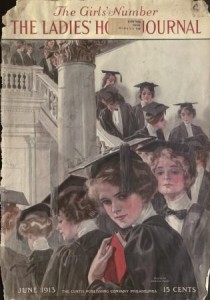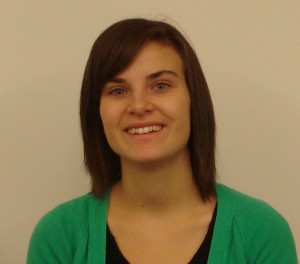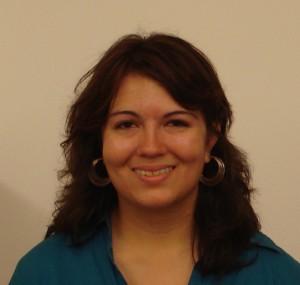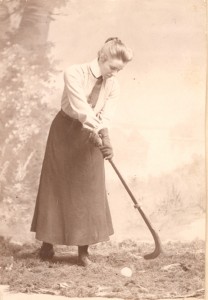 We are excited to be launching our first exhibition, Taking Her Place, later this month (January 28th) at the Rare Book Room in Canaday Library. This exhibition has been inspired by our research into the history of women’s education, which offers a panoply of views, narratives and interesting examples of how women have successfully navigated their way into education and used this to gain access to the traditionally male public world.
We are excited to be launching our first exhibition, Taking Her Place, later this month (January 28th) at the Rare Book Room in Canaday Library. This exhibition has been inspired by our research into the history of women’s education, which offers a panoply of views, narratives and interesting examples of how women have successfully navigated their way into education and used this to gain access to the traditionally male public world.
As a recent reviewer of Belinda Jack’s new book, The Woman Reader commented, images of women reading were often layered with meaning beyond simple education. As with other forms of expression on women and learning, morality issues were never far away :
Achtung, women of bygone days! The lesson is that reading leads to neglect of domestic duties and potential failure to fulfil childbearing quotas. Worse, the painting conveys an implicit fear that women might learn things, even – perish the thought – things their husbands or fathers don’t know. If a little knowledge is a dangerous thing, then more of that knowledge could amount to power – and independence.
We reference these opinions in a section on popular literature from the nineteenth century which often contained treatises outlining the appropriate kinds of learning for women, or conversely, some passionate arguments for the higher education of women for the good of society. Our exhibition also explores images of women reading and studying, including some familiar faces such as Mamie Gwinn, intimate friend of M. Carey Thomas and once a professor and a resident of the Deanery at Bryn Mawr.
Taking Her Place has eight separate sections, tracing the history of women’s education through the treasures of Bryn Mawr College’s Special Collections. It includes a focus on some famous alums, among them many pioneers of new knowledge in their fields as well as the first women to occupy prominent positions (we won’t spoil it by telling you who they are, come and see for yourself on January 28th!). M. Carey Thomas herself admired genius and innovative thinkers, and revealed in 1908 that she hoped gender would be irrelevant in the realm of intellectual endeavor:
In the world of intellect eminence is so rare, and excellence of any kind so difficult to attain, that when we are dealing with intellectual values, or genuine scholarly, literary or artistic excellence, the question of sex tends to become as unimportant to men as to women (Women and College and University Education, 1908, page 69)
The question of sex, however, was very important in the nineteenth and early twentieth centuries when it came to education. As the exhibition also traces, there were many who objected on grounds of propriety, or on the basis of misguided ideas of women’s ability to learn, to the full and equal education of women. Despite this, there were many vociferous women who defended their and other women’s right to learning. Indeed, it seems having the confidence to advocate for learning, and for women’s wider role in society, was key. The importance of learning for self-development and discovery and the transformative effect reading can make on our lives was recognized by Catharine Maria Sedgwick in 1839 as she pondered the magic of knowledge:
It is only by attention that as our eyes pass over a book, we transfer its knowledge into our own minds. No book will improve you which does not make you think; which does not make your own mind work.
Catharine Maria Sedgwick, Means and Ends of Self-Training (available on Google books)
Our Advisory Board member Professor Mary Kelley has written about the historical importance of women’s reading and their participation in literary and voluntary societies for their growth in self-confidence. This led many to believe in their ability to contribute to society both inside and outside their homes. In Learning to Stand and Speak, Kelley has traced the histories of many women and her work in this field has inspired one of the sections in the exhibition.
 Taking Her Place will feature a number of events throughout the time it is being displayed, starting with the opening lecture by Professor Helen Horowitz and also includes a guest lecture by Bryn Mawr College alum and eminent feminist critic, Elaine Showalter, Avalon Foundation Professor Emerita at Princeton University. All events are free and open to anyone who would like to attend. We will also be conducting some special events for alumnae, including a local Philadelphia chapter event, and guided tours as part of Alumnae Reunion weekend.
Taking Her Place will feature a number of events throughout the time it is being displayed, starting with the opening lecture by Professor Helen Horowitz and also includes a guest lecture by Bryn Mawr College alum and eminent feminist critic, Elaine Showalter, Avalon Foundation Professor Emerita at Princeton University. All events are free and open to anyone who would like to attend. We will also be conducting some special events for alumnae, including a local Philadelphia chapter event, and guided tours as part of Alumnae Reunion weekend.
Keep up to date with the events of the exhibition by visiting our website and following us on Twitter – @GreenfieldHWE. If you have any queries about the exhibition, please email greenfieldhwe@brynmawr.edu





